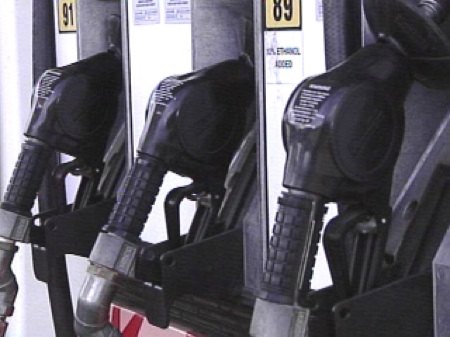U.S. Commission: Raise Federal Gas Tax and Start Monitoring

The recent historic drop in fuel consumption has translated into a $3b drop in taxes going into the Highway Trust Fund year-on-year. It’s a crisis! It’s a good thing that GW Bush signed into law the “ Safe, Accountable, Flexible, Efficient Transportation Equity Ac t” back in August ’05. The Act empaneled the National Surface Transportation Infrastructure Financing Commission (NSTIFCT), and directed it to devise a new way to finance the Highway Trust Fund. Reuters has secured a draft copy of the commission’s final report. NSTIFCT’s recommending that Congress should raise U.S. gasoline taxes by 10 cents a gallon later this month, to “fix bridges and ease congested highways.” But that’s not all! “The gas tax is broken, so any increase in gas tax is just a Band-Aid,” commission member Adrian Moore said. “It gets you through a very short term. It doesn’t even remotely solve the problem.” Actually, the only thing broken about the federal gas tax is that it’s fixed at 18 cents per gallon. The tax hasn’t been adjusted for inflation– or any other factors– since it was last increased in 1993. But Mr. Moore doesn’t point out obvious fixes like indexing the federal gas tax to inflation, or otherwise periodically adjusting the tax based on the needs for highway spending. Anyway, Mr. Moore is down with pay-as-you go, we-know-where-you-are road pricing. Privacy concerns? No worry, Big Brother will not be a government agency, but a consortium of private road builders looking for a profit. Sort of like health insurance companies, only more intrusive. So which would you rather have, private toll roads and FasTrack monitoring everywhere, or gas taxes adjusted as needed to keep our highways in an adequate state of repair? Here’s hoping we get to make that choice.

More by John Horner
Latest Car Reviews
Read moreLatest Product Reviews
Read moreRecent Comments
- Jeff One less option will be available for an affordable midsize sedan. Not much can be done about GM discontinuing the Malibu. GM, Ford, and Stellantis have been discontinuing cars for the most part to focus on pickups, crossovers, and suvs. Many buyers that don't want trucks or truck like vehicles have moved onto Japanese and South Korean brands. Meanwhile large pickups and suvs continue to pile up on dealer lots with some dealers still adding market adjustments to the stickers. Even Toyota dealers have growing inventories of Tundras and Tacomas.
- Lorenzo This car would have sold better if there was a kit to put fiberglass toast slices on the roof.
- Lorenzo The Malibu is close to what the 1955 Bel Air was, but 6 inches shorter in height, and 3 inches shorter in wheelbase, the former making it much more difficult to get into or out of. Grandma has to sit in front (groan) and she'll still have trouble getting in and out.The '55s had long options lists, but didn't include a 91 cubic inch four with a turbo, or a continuously variable transmission. Metal and decent fabric were replaced by cheap plastic too. The 1955 price was $1765 base, or $20,600 adjusted for inflation, but could be optioned up to $3,000 +/-, or $36,000, so in the same ballpark.The fuel economy, handling, and reliability are improved, but that's about it. Other than the fact that it means one fewer sedan available, there's no reason to be sorry it's being discontinued. Put the 1955 body on it and it'll sell like hotcakes, though.
- Calrson Fan We are already seeing multiple manufacturers steering away from EVs to Hybrids & PHEVs. Suspect the market will follow. Battery tech isn't anywhere close to where it needs to be for EV's to replace ICE's. Neither is the electrical grid or charging infrastructure. PHEV's still have the drawback that if you can't charge at home your not a potential customer. I've heard stories of people with Volts that never charge them but that's a unique kind of stupidity. If you can't or don't want to charge your PHEV then just get a hybrid.
- AZFelix The last time I missed the Malibu was when one swerved into my lane and I had to brake hard to avoid a collision. 1 out of 5⭐️. Do not recommend.


































Comments
Join the conversation
I'm a fairly libertarian kinda guy, but the last thing we need to do is to privatize the roads. I'd happily pay an extra 50cents a gallon if that went to fund highway/road and other transportation projects. The infrastructure here in Northern Virginia is embarrassingly poor, if not outright crumbling.
How complex is road funding in the USA? I'm keen to know. In Australia we have three tiers; nationally important, state and then city/county roads. National roads get funding from our federally raised via a flat excise on fuel (which doesn't cover the costs) and income taxes. State roads are funded from state budgets with their revenues from our national GST (or VAT) 10% consumption tax, plus state's get grants from the federal government and for special projects. City/county roads are paid for by resident rate-payers mostly, but they can apply to a pool of state or federal grant money as well. There are very few toll roads (loss making mostly), and car registration is reasonable. Trucking (as in articulated prime movers, not pickups) have more expensive registrations but certainly not paying for the road damage they do. Our nation is trying to get more freight onto rail by changing that cost-of-damage imbalance. Our roads are pretty good compared to what I've experienced in many countries and our system results in few arguments. We haven't solved the political pork problem however....yet.